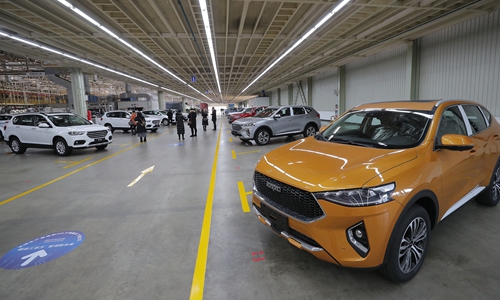China’s GWM to take over Thai, Indian plants from GM
US carmaker exits unprofitable Asian operations

Cars in Great Wall Motors' factory in North China's Tianjin municipality Photo: VCG
Chinese carmaker Great Wall Motors (GWM) will take over General Motor's (GM) manufacturing facilities in Thailand by the end of 2020, as the US automaker prepares to withdraw from some non-profitable operations in Asian Pacific region.
"Under a signed binding term sheet, GM Thailand and GM Powertrain Thailand legal entities, which include the Rayong vehicle assembly and powertrain facilities, will transfer to GWM," the Chinese automaker said in a statement released on Monday.
GM and GWM are targeting the end of 2020 to close the deal and hand over the site.
The Thai deal will be the second recent plant purchase GWM from GM, following another agreement the two reached in January to transfer GM India's Talegaon manufacturing facility to GWM.
"The global strategy of Great Wall Motors has begun to take shape after more than 10 years of development," said Liu Xiangshang, GWM's global strategy vice president."In the past two years, through export model transformation and upgrades, Great Wall Motors has accelerated the pace of its strategic global roll-out."
In 2019, GWM started production at its Tula plant in Russia, and the company also reached an agreement with GM to buy the latter's Talegaon plant in India in January 2020.
GWM believes that the purchase of GM's Thai Rayong plant will not only boost its business in Thailand, but also speed up sales in other Southeast Asian countries."Great Wall Motors will expand through the entire ASEAN region with Thailand as the center, and export its products to other ASEAN countries as well as Australia," Liu added.
GM, the largest US automaker in terms of vehicle sales, has also announced its decision "to wind down sales, design and engineering operations in Australia and New Zealand and retire the Holden brand by 2021."
GM said the "decisive action" was aimed at "building on the comprehensive strategy it laid out in 2015 to strengthen its core business, drive significant cost efficiencies and take action in markets that cannot earn an adequate return for its shareholders."
"I've often said that we will do the right thing, even when it's hard, and this is one of those times," GM chairman and CEO Mary Barra said in a statement.
"We are restructuring our international operations, focusing on markets where we have the right strategies to drive robust returns, and prioritizing global investments that will drive growth in the future of mobility, especially in the areas of EVs and AVs," she added.
Australian icon car brand Holden merged in 1931 with GM to become General Motors-Holden's Limited.
GM had already stopped manufacturing Holden vehicles in Australia back in 2017, resulting in about 3,000 job losses, more of which are expected after Monday's announcement.
"After considering many possible options and putting aside our personal desires to accommodate the people and the market, we came to the conclusion that we could not prioritize further investment over all other considerations we have in a rapidly changing global industry." said GM president Mark Reuss, who once oversaw GM-Holden operations.
GM has recently invested heavily in electric vehicles, including a 2.2 billion US dollar assembly plant near Detroit for electrical vehicles. It has also partnered with other companies to develop autonomous vehicles.
GWM, headquartered in Baoding, northern China's Hebei Province, is a manufacturer of SUV and pickup vehicles.
With more than 1 million annual sales in the past four consecutive years, it has exported vehicles to more than 60 countries and regions at competitive prices.
With the transfer of Indian and Thai assembly plants by the end of 2020, if GWM can get final approvals from relevant governments and regulators, the Chinese SUV and pickup maker will be able to dramatically expand its overseas production.
